Xi’an, Shaanxi Province, May 20, 2023 – Countries of Central Asia are rallying around the People’s Republic of China in a bid to strengthen economic cooperation and foster future development.
It followed the conclusion of the first ever China-Central Asia Summit hosted by President Xi Jinping in Xi’an, Northwest China’s Shaanxi Province.
China sees the Central Asian region as strategic partner in its push for modernization and development through the Belt and Road Initiative.
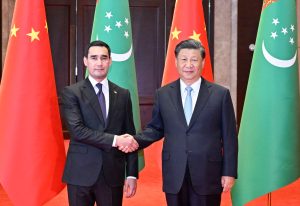
Chinese President Xi Jinping meets with Turkmen President Serdar Berdimuhamedov at the China-Central Asia Summit, in Xi’an
Leaders of the republics of Kazakhstan, Kyrgyzstan, Tajikistan, Turkmenistan, and Uzbekistan were on Friday, May 19 locked in discussions hosted by President Xi at the Xi’an International Convention Center, taking stock of cooperation outcomes and pointing the way for the future.
Central Asia, also known as Middle Asia, is a region of the continent that stretches from the Caspian Sea in the west to western China and Mongolia in the east, making it crucially significant for the BRI infrastructure connectivity programs.
Following Friday’s meeting, President Xi Jinping delivered the Joint Communique at the Xi’an Convention Center, flanked by President Kassym-Jomart Tokayev of Kazakhstan, President Sadyr Japarov of Kyrgyzstan, President Emomali Rahmon of Tajikistan, President Serdar Berdimuhamedov of Turkmenistan and President Shavkat Mirziyoyev of Uzbekistan.
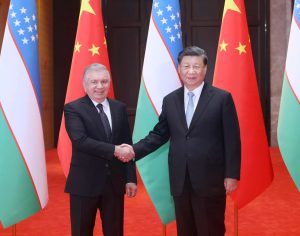
President Xi Jinping holds talks with Uzbek President Shavkat Mirziyoyev, in Xi’an
According to President Xi, the Summit reviewed the history of friendly exchanges between China and Central Asia, took stock of cooperation outcomes, summed up successful experience, and built new consensus.
The ‘Xi’an Declaration’
Known as the Xi’an Declaration, after the Capital of Shaanxi Province, the birthplace of the Ancient Silk Road, the Joint Statement adopted a list of outcomes, and charted a blueprint for the future development of China-Central Asia relations.
It seems that the six nations are planning far ahead of the current generation. As President Xi puts it, “facing profound changes unseen in a century, and bearing in mind the fundamental interests and bright future of our peoples, the six countries are determined to work together to rise up to challenges, foster a closer China-Central Asia community with a shared future, and contribute to building a community with a shared future for mankind”.
The six countries also agreed to firmly support each other on issues concerning respective core interests such as sovereignty, independence, security and territorial integrity, respect the development path chosen based on each other’s national conditions, and firmly oppose interference in internal affairs by any force or under any pretext.
Leaders of the Central Asian countries also fully recognized the significance of the Chinese path to modernization for the world’s development and have reiterated their firm commitment to the one-China principle.
President Xi noted “the six countries will take the 10th anniversary of Belt and Road cooperation as a new starting point. Efforts will be made to build better synergy among development strategies, promote trade liberalization and facilitation, expand industrial and investment cooperation, further develop transport corridors connecting China and Central Asia, support the establishment of a China-Central Asia energy development partnership, encourage cooperation on high technologies, and ensure food security in the region. Together, we will foster a new cooperation paradigm featuring high-level complementarity and mutual benefit”.
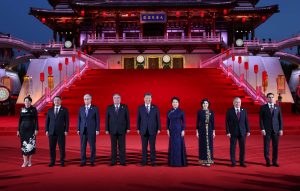
President Xi and his wife Peng Liyuan pose for a group photo with the visiting Presidents
On other fronts, the parties agreed to deepen people-to-people exchanges by actively cooperating in the areas of, archaeology, tourism, medical and health care, among other.
The Communique as read by the Chinese Leader, added “we will ensure the success of the Year of Culture and Arts for the Peoples of China and Central Asian Countries (China-Central Asia youth arts festival), establish culture centers in each other’s countries, expand mutual visits, encourage youth exchanges, and jointly implement the “Cultural Silk Road” program”.
There is also great news on the educational front as China reaffirmed it will continue providing government scholarships to young students of Central Asian countries, set up more Luban Workshops and traditional medicine centers in Central Asia, and help them develop high-caliber talents.
Leaders Firm on Security and Terrorism
Recognizing any emerging security threats, China and the Central Asian Nations agreed to ‘resolutely’ combat all forms of terrorism, separatism and extremism, as well as drug trafficking and transnational organized crimes.
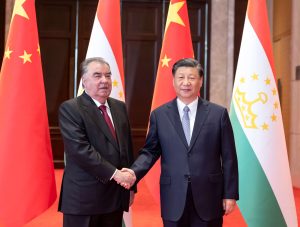
President Xi Jinping holds talks with Tajik President Emomali Rahmon
This, the leaders believed, include stepping up cooperation on bio-security, cyber-security, and disaster relief, and continuing to help the Afghan people to maintain security and stability, and realize peace and reconstruction. The Leaders hoped that these actions will see the region working together with China to build a Central Asia that features no-conflict while maintaining the peace.
China and Central Asia Leaders on UN
The six countries recommitted themselves to continuing abiding by the purposes and principles of the United Nations Charter, firmly upholding multilateralism and the universally recognized international law and norms governing international relations, safeguarding international fairness and justice, and make the international order and global governance system fairer and more equitable.
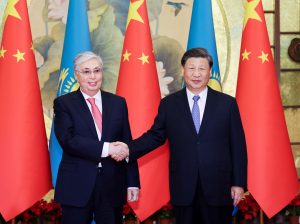
President Xi Jinping and President Kassym-Jomart Tokayev of Kazakhstan
All sides have expressed support for and readiness to operationalize the Global Development Initiative, the Global Security Initiative and the Global Civilization Initiative, recognizing their significance for world peace and development, and for progress of human civilization.
New Mechanism for enhanced cooperation
The Leaders of China, Kazakhstan, Kyrgyzstan, Tajikistan, Turkmenistan, and Uzbekistan at the close of the summit officially inaugurated the China-Central Asia Summit Mechanism, a move that will see biannual a meeting of regional leaders on issues of concern. The next summit will be held in Kazakhstan in 2025.
The six countries assured of working to flesh out the mechanism and establish a permanent secretariat in China. They agreed to also make transport, commerce, investment and industry, agriculture, energy, customs and people-to-people exchanges as top priority areas and take solid and efficient steps to promote all-dimensional and deep-going cooperation among the six countries.
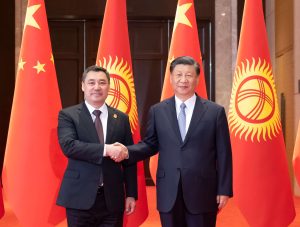
President Xi Jinping holds talks with Kyrgyz President Sadyr Japarov,
In the joint statement, President Xi concluded that the summit has been a good start for cooperation and he believed that with joint efforts, China’s relations with Central Asian countries will forge ahead like a ship braving all winds and waves, offer new vitality to the development and revitalization of the six countries, and inject strong, positive energy to peace and stability of the region.

